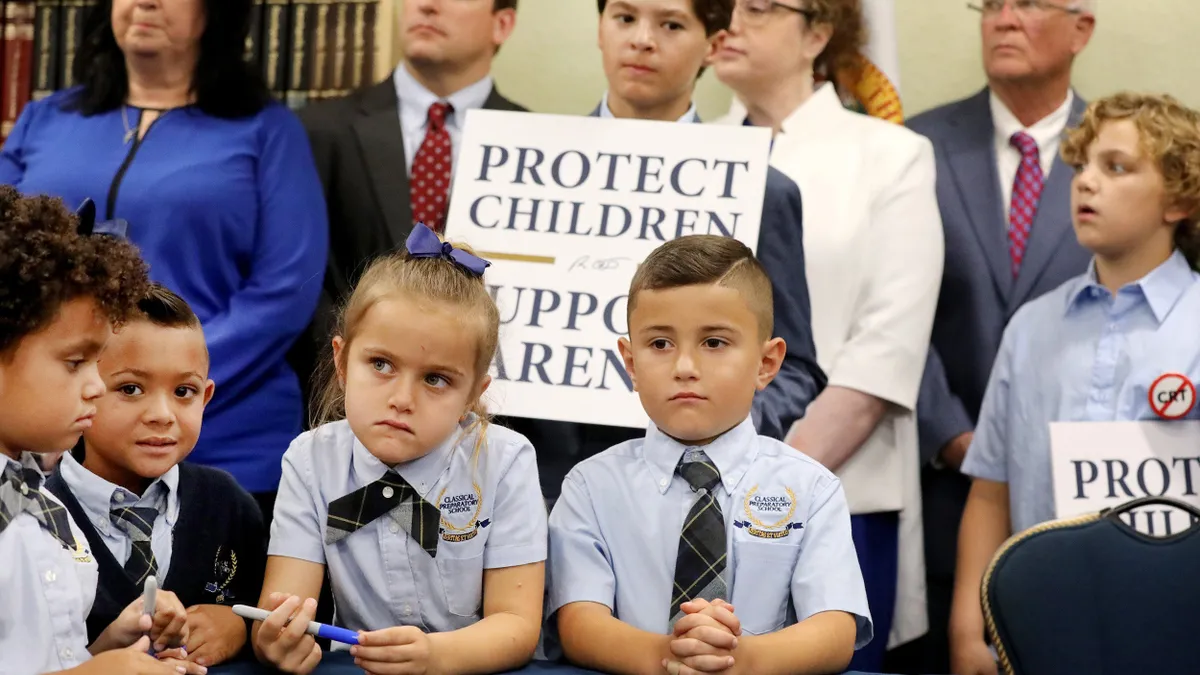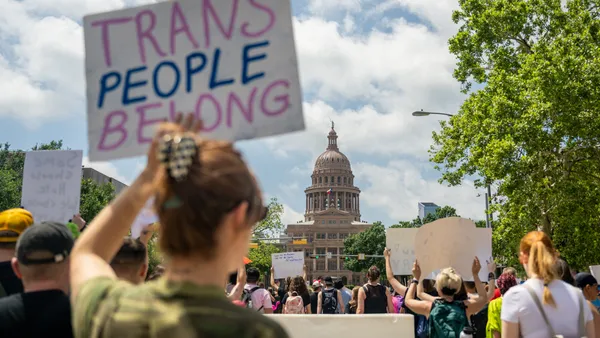Almost half of states saw legislation introduced in the first three months of 2023 that would regulate student pronoun usage in schools, according to a count by the National Conference of State Legislatures.
As of April 6, there had been at least 43 pieces of legislation introduced that would regulate students' pronoun use across 24 states. Legislatures in many of the same states have previously proposed or passed laws regulating curriculum related to gender and sexuality in public schools.
A majority of those 43 bills would prohibit school employees from using students' preferred pronouns if they don't align with their sex assigned at birth or their legal name, without first notifying or getting parental consent.
However, the repercussions, enforcement and language of these bills vary widely by state. And some would regulate other actions in addition to gender pronoun usage. For example:
- A bill introduced in Kentucky would require parents to be notified if a "student significantly changes his or her gender expression" or "expresses an inconsistency" between their sex assigned at birth and their gender identity, as well as any changes in pronoun usage. These additional terms are a broader umbrella than something more specific like "pronoun usage" that other states have also sought to regulate.
- In Missouri, schools would be required to notify families within 24 hours if students "express discomfort or confusion" about their gender identities, as well as if they say they prefer pronouns different from their sex assigned at birth.
- In Texas, districts could lose state funding if an employee is found "assisting a student enrolled in the district with social transitioning," which includes, but is not limited to, pronoun usage.
While a few of the state measures have already failed, many more remain pending. Regardless of the bills' status, the issue of gender and sexuality in schools has been a deeply divisive one across states and localities nationwide.
Many of the states that are seeking to regulate pronoun usage, for example, cite parental rights as a driving factor. In New Hampshire, lawmakers pushing for pronoun regulation say parents are "solely responsible for teaching their children about matters of faith, morals, and matters relating to their sexuality." Legislators in conservative-leaning states echo that sentiment in their bills.
On the other hand, LGBTQ advocacy and civil rights organizations that oppose bills regulating student pronoun usage in schools say requiring parental notification could put LGBTQ students in danger by leading to child abuse or other harmful scenarios.
"Trans and non-binary students are already ostracized and bullied in schools, and these bills do nothing to provide much-needed support and care to already marginalized students," said a spokesperson from the ACLU of Florida, a state that has been on the forefront of many anti-LGBTQ measures, in a statement. "Instead, they are meant to stigmatize LGBTQ+ youth and family members and make teachers fearful of providing a welcoming and inclusive classroom."
North Dakota's state chapter of the American Civil Liberties Union has also weighed in on schools' role in LGBTQ students' success, after Gov. Doug Burgum vetoed the state's pronoun usage bill earlier this month.
“The practice of being intentional about using pronouns — and asking others about the pronouns they use — is all about respect," said Cody Schuler, advocacy manager at ACLU of North Dakota, in a statement. "Many schools across the country recognize that a supportive learning environment requires treating students with dignity and respect, including — at a minimum — calling them by the name and pronouns they want to use."
A positive school climate and feelings of school connectedness could be a buffer against negative feelings and behaviors that are more likely to appear in LGBTQ students, according to multiple reports released this year by the Centers for Disease Control and Prevention.
Those reports found LGBTQ youth are more at risk for mental health and behavioral challenges like substance misuse and persistent feelings of sadness or hopelessness. And more than 20% surveyed by the CDC reported attempting suicide in 2021.















